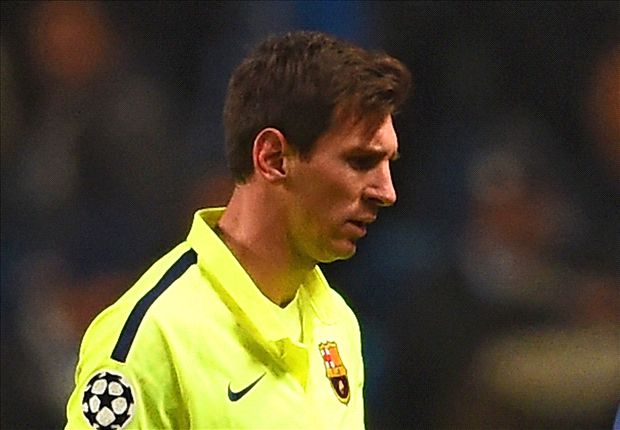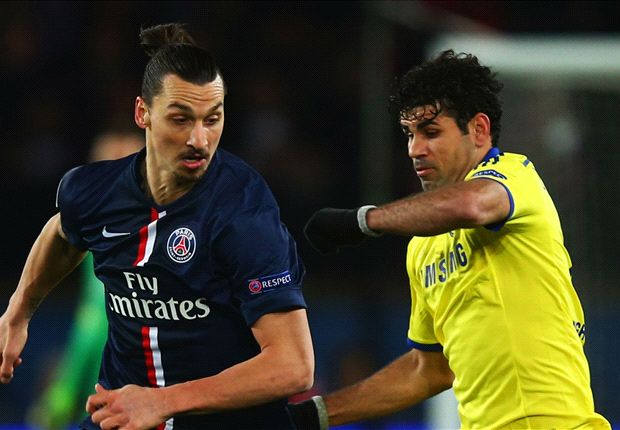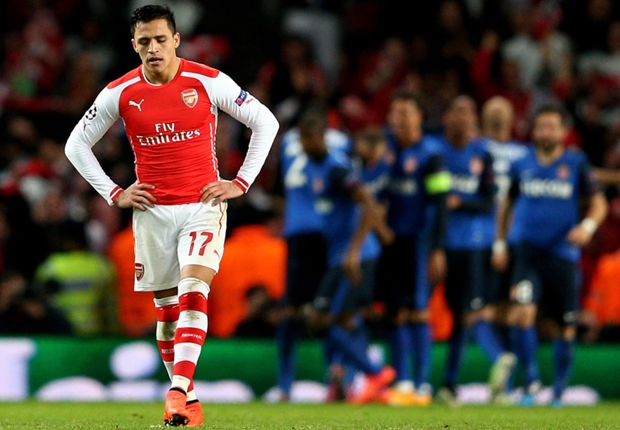
COMMENT: The Barca star had what was paradoxically
his best and worst game of the season, while those complaining about
Qatar and Russia should look closer to home
Let’s get the awkward facts out of the way. Lionel Messi surrendered possession in the run-up to Manchester City’s goal at the Etihad which leaves the English champions still in with a chance in their last 16 tie against Barcelona.
Then he missed a penalty when better candidates were on the field and ready to take it. Worse still, he missed the subsequent opportunity to follow up Joe Hart’s save with a lamentable off-target header.
Taken in isolation those were three pretty ordinary moments. And as Messi, along with Gerard Pique, trundled through the media area in Manchester with faces like thunder you can be sure that the Ballon d'Or runner-up was not thinking about his masterful performance in the first half but letting opportunities to quell City's challenge slip through his fingers.
Paradoxically, Messi’s performance against City was easily his best of the season and represents his evolution under Luis Enrique. The goals had been slowing down. There were signs that he was not enjoying his game. There were hints he was no longer enjoying Barcelona. However, Messi has surrendered part of his ego to Luis Enrique for the sake of the collective.
He is probably no longer the best in the world in the position of centre forward but there is no other player on the planet who can do what Messi can a little futher back. In previous days a switch to the right wing was enough of an affront to have Messi clocking in half-hearted displays. Now it has reinvigorated him.
Up front and meekly disinterested for large parts of the game, it was easy to lose sight of the attributes which mark Messi out as one of the best of all time. In a deeper role, his dribbling, his through ball ability, his balance and ease in dictating the pace of play are all again apparent. He has the enthusiasm of his 21-year-old self but the experience and know-how of a veteran.
Barcelona have occasionally failed to fire this season; no surprise seeing as they are engulfed in institutional chaos. Messi, though, unifies the team and with him playing so well they can win every match. There is undoubtedly an improvement in Messi’s attitude and talk of a détente between the No.10 and Luis Enrique would appear to be accurate.
Now Messi must go the whole way. His dictatorial tendencies again surfaced on Tuesday and cost Barcelona. He should not have taken that penalty, not with a record as patchy as his and a technique that is still clearly a work in progress. He should have taken more care in possession with Gael Clichy in attendance. And he'll know that. He'll learn from this and a more ruthless, selfless Messi may be in development.
| Dortmund's Lewy loss is nobody's gain |

The evidence confirms that Borussia Dortmund are missing Robert Lewandowski but Bayern Munich are no better off with him.
Yes, he scored a couple of goals last weekend against Paderborn but Bayern would have easily dispensed with the Bundesliga minnows without him.
The Champions League is a more accurate way of measuring Lewandowski’s worth to Bayern and the impact his departure has caused at Dortmund.
He has scored two goals in this competition for Bayern. One was scored in the 7-1 win against Roma and the other, admittedly, did look important as it was an equaliser against Manchester City.
Dortmund did well to overcome a tough group stage but the likes of Adrian Ramos and Ciro Immobile have been unable to plug the gap as evidenced in the narrow 2-1 defeat to Juventus.
Lewandowski did not start Bayern’s last 16 tie against Shakhtar Donetsk. He was not injured. Pep Guardiola maintained it was his decision alone to leave out the Pole. He played, instead, with Mario Gotze up front. Even if Guardiola was conjuring a new way of winning, it is an indictment on Lewandowski that he cannot confirm himself as one of his coach’s certain picks.
It is impossible to imagine Jurgen Klopp, for whom Lewandowski scored 19 Champions League goals, leaving out the 26-year-old in order to catch the opposition by surprise. When fit, he played. Lewandowski knows that he was worth more to Klopp than he currently is to a man who has shunned orthodox strikers all throughout his career.
Klopp valued Lewandowski’s skills more and could use them far better than Guardiola, who has even used him wide on the left in a position usually occupied by Franck Ribery.
That line-up for Shakhtar away did nothing for the perception that Lewandowski was a vanity signing, designed primarily to weaken Dortmund and not strengthen Bayern.
Judging both teams' performances together, the value of Lewandowski to Bayern has not been what he has done for them but what his absence has done for Dortmund.
| Never mind World Cup, Russian and Gulf cash is already here |

The return of the Champions League coincided with the Fifa task force recommendation that the 2022 Qatar World Cup be played between the months of November and December, with a final slated for two days before Christmas that year.
The debate over Qatar's suitability to host the World Cup is again raging. There are many reasons to deplore the choice of Qatar as hosts, ranging from its criminalisation of homosexuality to unsafe working conditions which have left more than 1,000 migrant workers dead on World Cup projects.
The critics have also taken the opportunity to aim at Fifa over its decision to award the 2018 event to Russia. Current events in Ukraine have prompted talk of taking these 'vanity games' away from Vladimir Putin, whose stance in the region has riled up Westerners.
It has been a week of sanctimony. Fifa is all too willing to handle the money passed to it by Russia and the Qataris, goes the argument, in a way that does not sit comfortably with football fans at large.
The money is already flowing into the game from places you wish it wasn’t and it takes only a cursory glance around Europe to prove it; Gazprom, Russia’s energy giant, is the Champions League chief sponsor. Now let’s take a look at the teams in the last 16.
Chelsea, Monaco and Shakhtar Donetsk are operated by oligarchs who made their fortunes in the breakup of the Soviet Union. Schalke are also sponsored by Gazprom. Meanwhile, Paris Saint-Germain are in their entirety bankrolled by Qatar.
Bayern Munich through a complex sponsorship arrangement have gone there for winter break the last five years running. Their coach Pep Guardiola played there and was an ambassador for their World Cup bid. Qatar is also the name emblazoned on the shirts of Barcelona.
Moreover if human rights, the imposition of sharia and labour conditions in the Gulf are your concern then remember that Arsenal and Real Madrid are sponsored heavily by Dubai’s Emirates airline - a subsidiary of the government. Manchester City owe everything to Abu Dhabi and Madrid are eager for it to finance its new stadium.
When the time comes to criticise governing bodies and clubs for the origin of their cash, be consistent.
| English TV money not worth the paper it's printed on |

The English Premier League is about to be lavished with more cash than it knows what to do with. Between the years of 2016 and 2019, when the new domestic television contract kicks in, finishing 17th in the Premier League will be worth some £100 million. For context, Real Madrid banked around half that amount in prize money and broadcast revenues for winning the Champions League last season.
The Premier League retains its widespread appeal and that is reflected in its vast wealth. The last contract it signed was not too shabby either and allowed clubs like Arsenal and Chelsea to pay top dollar for players like Alexis Sanchez, Mesut Ozil, Willian and Diego Costa. When a big Premier League club comes calling it is very difficult for a selling team to say no. What, though, has been the net gain by England's clubs in the Champions League as a result of these riches? Precisely nil.
The Premier League representatives hit their peak in 2008 when they provided three of the four semi-final teams. This year, they will be lucky to get one despite the investment. Not one English team managed a victory in the last 16 first-legs. Of the four initial qualifiers, Liverpool are already out - beaten by Basel.
Chelsea look reasonably well-placed for progress after taking an away goal from Paris St-Germain. Manchester City and Arsenal, though, look doomed after first-leg defeats.
Competitively, it has been a chastening experience for English clubs and there is the genuine risk that the transfer fee and wage bubble will continue to inflate over the next few years without accompanying growth of the standard of play, or player developement for that matter. Why produce a player when you can buy a ready-made one for €30m?
The difference makers for sides in the last 16 include Hakan Calhanoglou, Marco Reus and Geoffrey Kondogbia. These are players raised and blooded in their own leagues from a young age. There is no English equivalent to decisive players like these and has not been since Wayne Rooney emerged about 12 years ago.
Resource-wise, England's teams should be leading from the front. That they are not is a reflection on English football's continued cannibalisation of itself.
| Monaco and Leverkusen upset the seedings |

The Champions League group stage draw gave us one afterthought of a group. Benfica, Zenit St Petersburg, Bayer Leverkusen and Monaco were all drawn together in an ordinary-looking Group C. Whoever qualified from that group would have been seen as the soft-touch in the knockouts.
As it transpired, Monaco won the group, jumping from Pot 4 to position one in the process, while the third-ranked side in the pool, Leverkusen, finished second. It was, collectively, a stunning act of defiance because Uefa's ranking system does everything it can to ensure that the bigger, traditional clubs from the biggest television territories come first and second.
Arsenal are not worth their place as top seeds in the Champions League, we know that. Their form in the competition reflects that. Yet they maintain their place in the top eight in Uefa's co-efficient and, as such, they are given the best chance to progress to the knockouts. There are safeguards in place to ensure they do.
Leverkusen and Monaco were the only two teams from Pots 3 and 4 to make it through the group stages. Six top seeds finished top of the group, maintaining the status quo. Only Benfica and, predictably, Arsenal didn’t. Monaco and Borussia Dortmund were the teams who finished top of their groups when the ranking system suggested they wouldn’t.
Furthermore, only Juventus and Leverkusen managed to buck the trend and win the first leg at home. All other ties look to have the seeds in control. Understandably there is caution in teams’ approaches to knockout football but that only two teams in eight could muster a win is a damning indictment on the state of the Champions League. It’s bloated, long and very boring until the semi-finals. Something has got to shake it up.
The Elo Rating should be used to sort the seeds. This ranking presents a far more accurate picture of the strong teams in European football than Uefa’s five-year coefficient system.


No comments:
Post a Comment